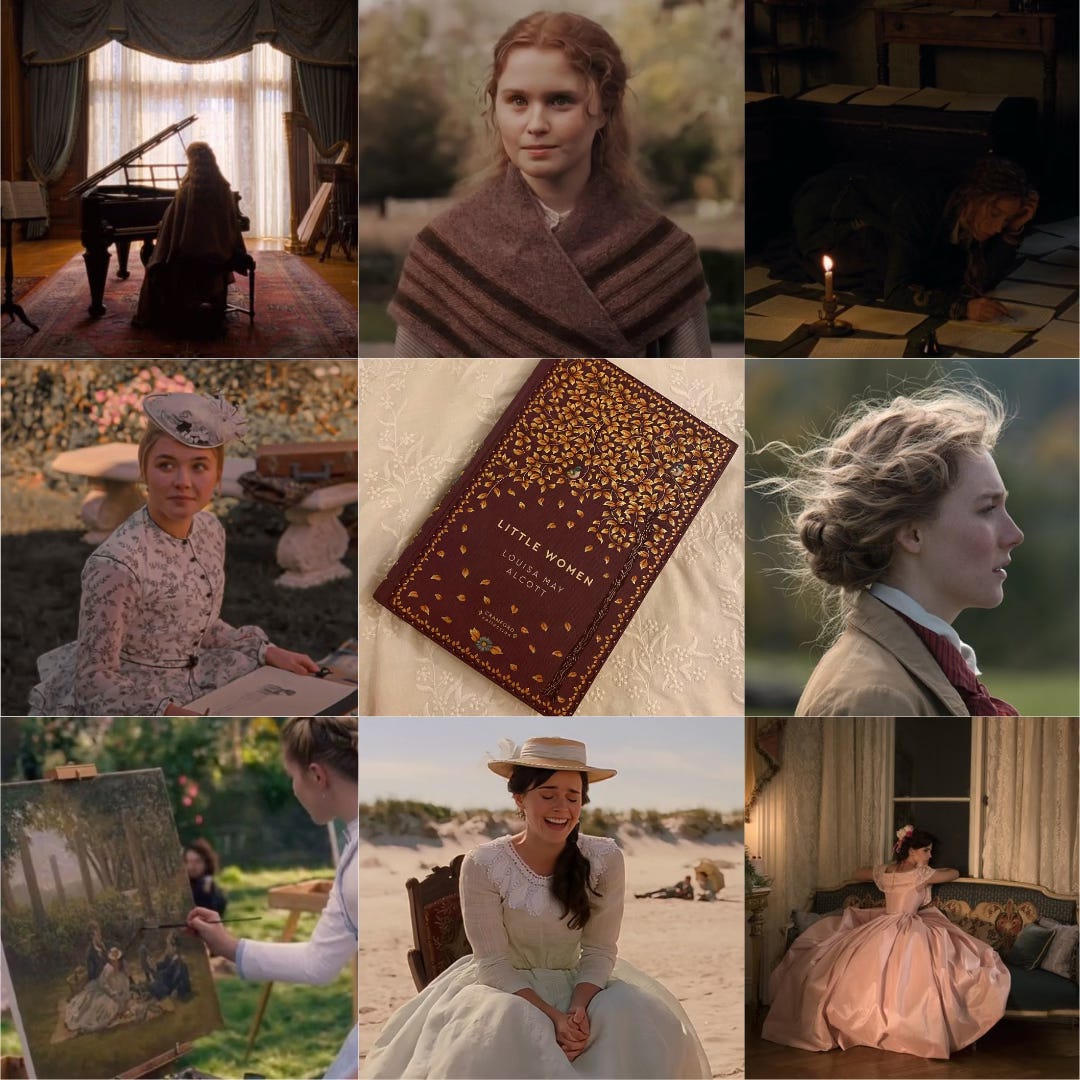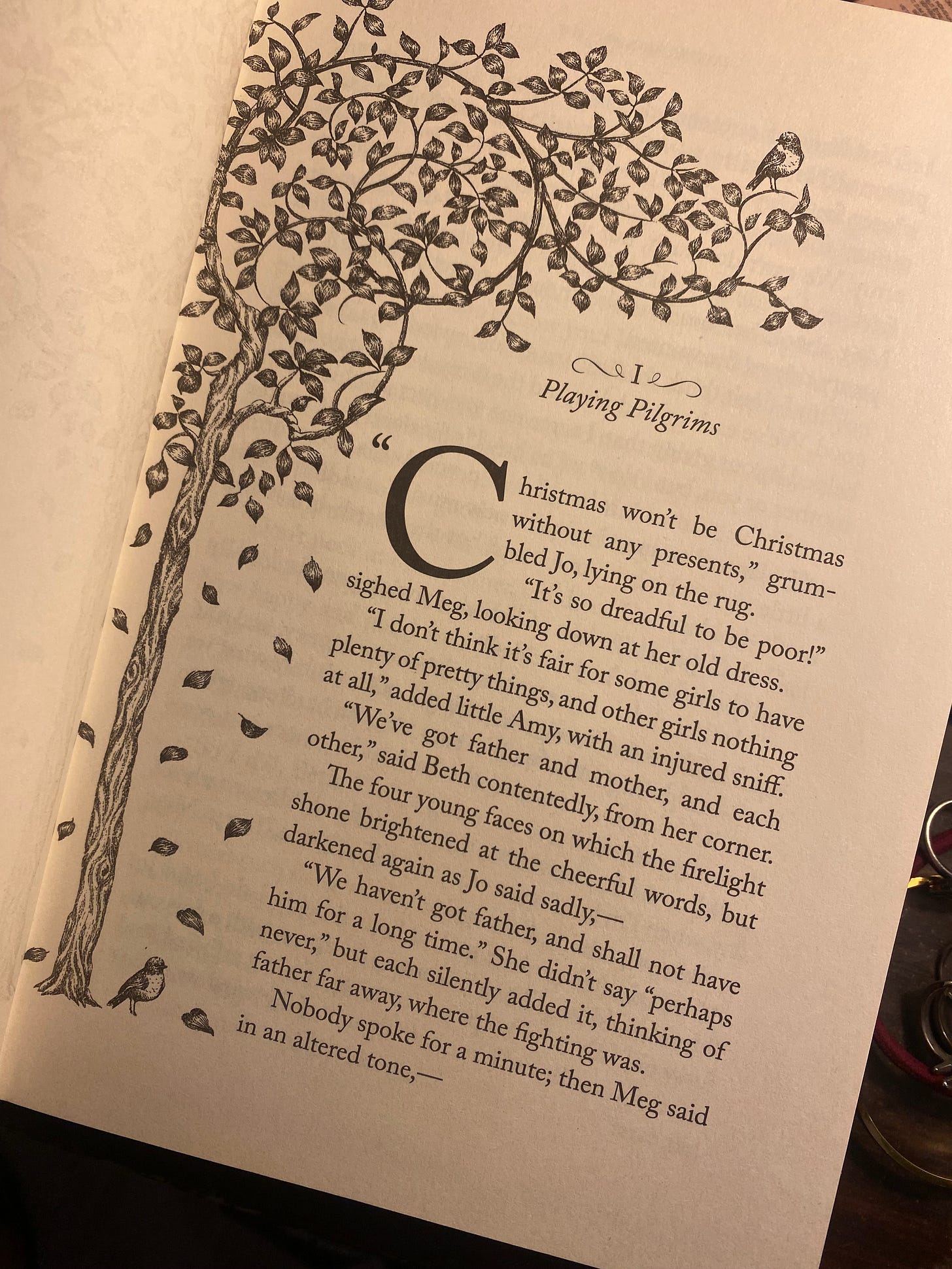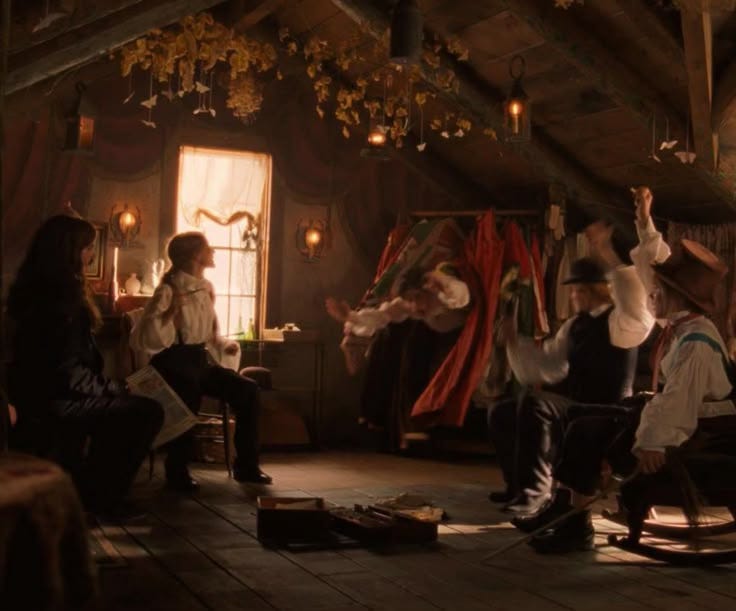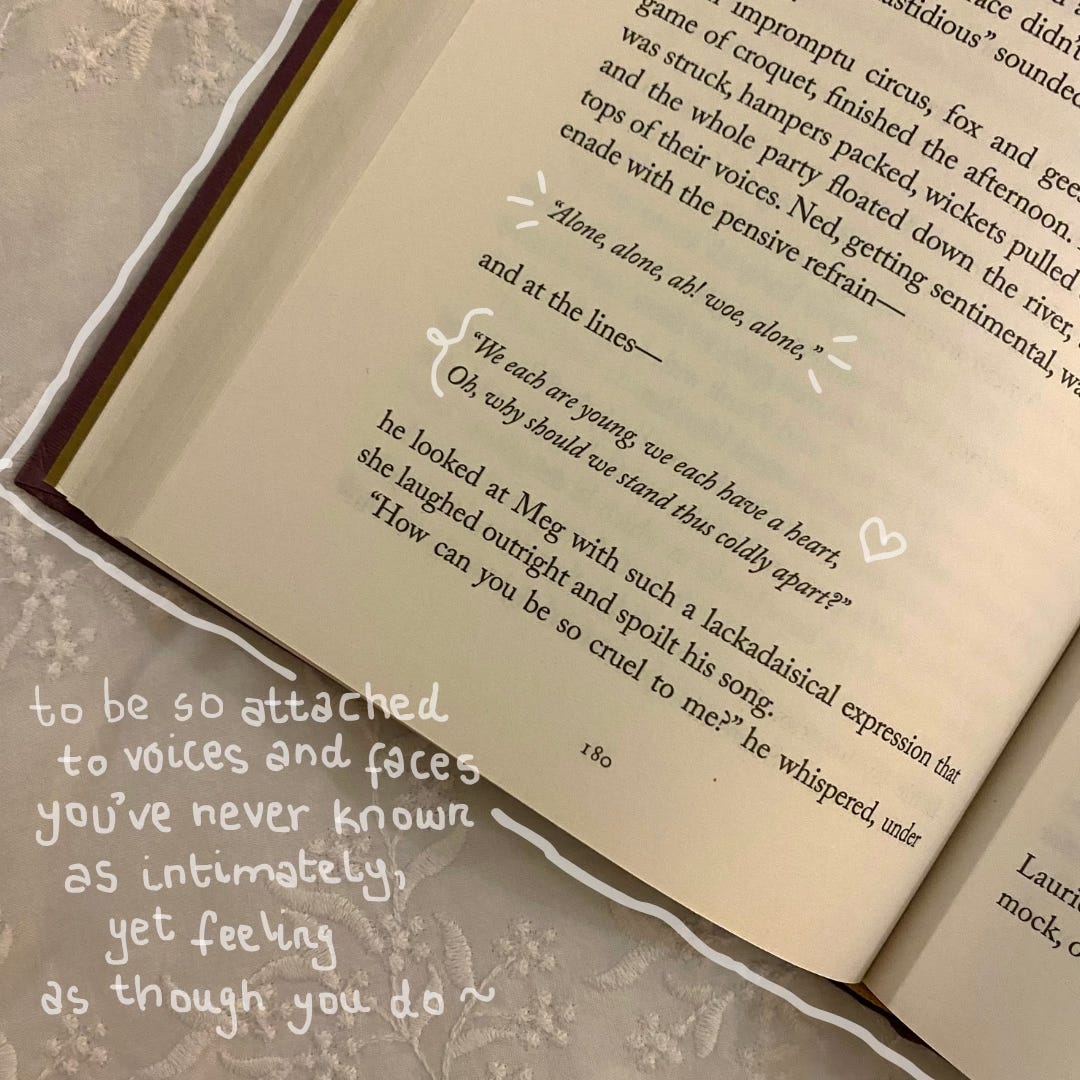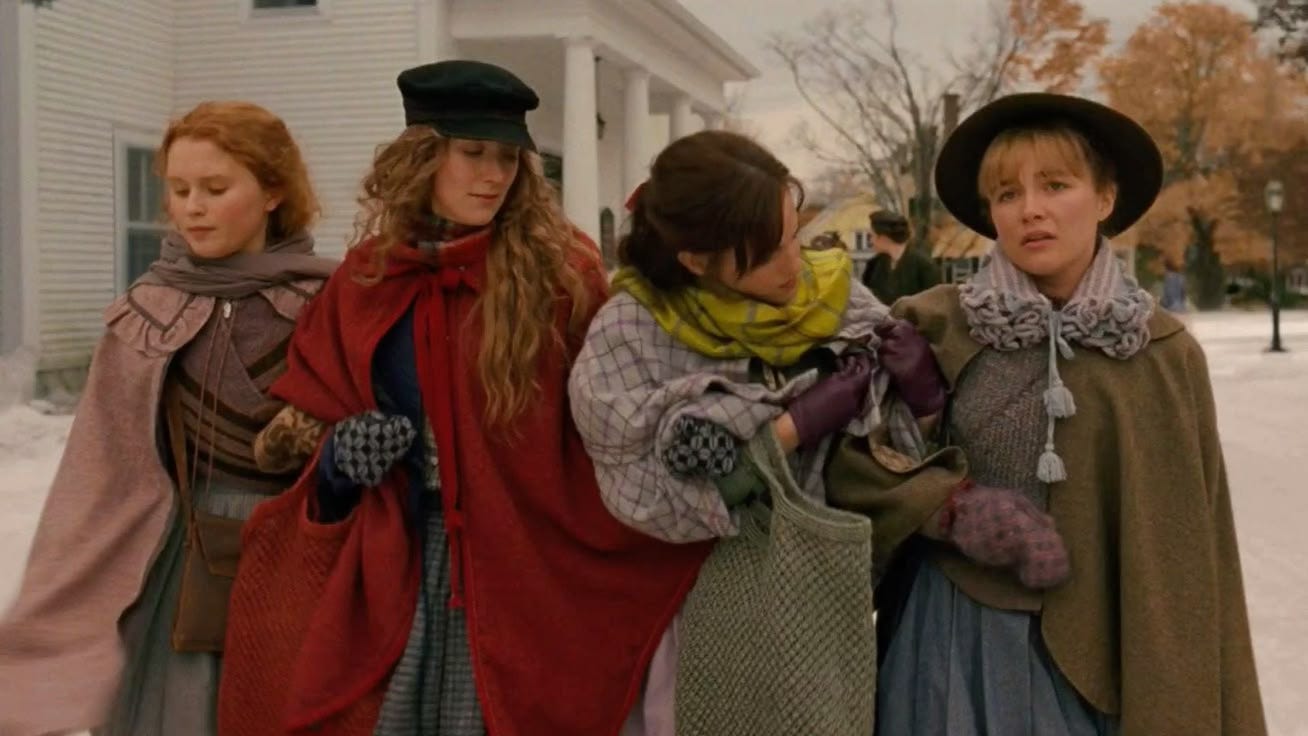When Women Write About Womanhood
An Ode to L. M. Alcott's Little Women. Written by Fareeba Ansari.
Where do you begin writing about something that ever so perfectly encompasses the struggle of womanhood? Where should I begin talking about a novel that has tangled itself up in my heartstrings and has tucked itself away in my heartbeat, ever so snugly? Where do I begin with Little Women?
I’ve held a love of reading from a very young age. You see, I grew up around books towering over me on my father bookshelves. I was very little when I was handed my first book - it was something silly (in retrospect), one of those books you buy for children with massive lettering styles and lots of drawings. And ever since, my ambitions were sparked, wanting to read every book my dad owned.
You see, I’ve read almost every possible genre of literature. I’ve read about history, art, music, religion, philosophy, fantasy. Oh, the way I was so into fantasy books, always attracted to the idea of a female protagonist who created a warrior out of herself and fought with swords, or a bow and arrow, or magic. Those worlds have always been, and continue to be so enthralling only because they contain female figures capable of accomplishing anything!
Women have been at the forefront of my inspiration from a very young age. My first brushes with proper literary reads that I would handpick from the school library contained female protagonists that left me in absolute awe. And, yet, having spent the greater part of my teenage years reading variations of fiction, and transitioning into adulthood and finding myself lost in a hallway of many doors, each of which opens up to a different philosophical world, nothing has compared to the might of Little Women. Absolutely, and assuredly, nothing.
So, where do I even begin with Louisa May Alcott’s Little Women?
It starts off like any other tale: with wonder. Dramatic. Real. And slowly, but surely, the world of Meg, Jo, Amy and Beth begins unfolding. As wild and untamed as each of them, in their unique ways, Alcott weaves a story of four women, raised to unapologetically be their utmost authentic selves —for their own sakes above everyone else’s— in an era where the designation and stature granted to a woman depended on how homely she could be.
Without a doubt, each of the March sisters are relatable.
Meg, for wanting to be a woman who does not need to feel shy of herself for wanting to be graceful, to carry herself with elegance and beauty in each step. A woman, truly a woman, in every manner a woman is bedazzling and striking.
Jo, for her ambition; an unchecked desire to write and be as relevant, as respected as any other man in her era for writing and saying what is on her mind. To be a woman who is not shy of being bold, free, and unashamed of wanting different from what is expected of women in society and not wanting it to make her any less a woman.
Beth, oh sweet Beth and her calmness. Surrendered to her kindness and music. Wrapped up in the sweetness of putting others first, even if it takes away from her own self. The sheer and utter selflessness of caring and remembering that others, too, are addled in their own despair and inequalities.
Amy, childish for she is the youngest, but determined. Her determination to be somebody; recognised by the world for her talent and not looked down upon if she holds an attraction toward the material side of things. An artist will keel for aesthetics, of course. Why should that be taken negatively?
Not a moment goes by being dull with these four. In each sentence, each paragraph, each page there is life. It shines out of the clothbound seams of my copy of the book. I can hear their laughter in my mind, and feel my eyes twinkle in being able to perceive the world they conduct for themselves by simply reading.
There is an ever-present touch of reality in the magic being depicted by a woman who writes about womanhood. In truth, womanhood is unforgiving, and often perilous. We are born with more than the world’s weight on our shoulders. As women, we will be deemed the pride and joy of our families, we must exemplify our family name with honour in the strides we take and how we carry ourselves. But it is only to a certain age, a certain point. Because, one day we are to be given away. Married off, no longer akin enough to the names given to us because then we must bring honour and exemplify the name of another.
Has anyone ever stopped a woman and asked her if she was able to forget the weight she carried of knowing who her mother would have been had she never married and birthed children, and that her daughter too wonders the same about her own self as her footfalls follow her mother’s?
Has anyone ever stopped a woman and asked her if she has ever truly felt that she can be a woman without worrying about the feeling of constantly being under surveillance, even if she sits by herself in a doorless, windowless room?
Has anyone ever asked a woman, if her coming to terms with her own womanhood hasn’t left her shattered, confused, broken-hearted, in doubt, and at times even ashamed? All because she is a woman and that the term ‘woman’ alone denotes enough meaning to explain the entire breadth of concepts within the world and all that she must endure.
To be Woman is to be Pandora’s Box, opened, and everything inside will only ever be known and felt by yourself alone.
When I read Little Women, I felt as though I found a quaint, little space where I am not alone as a woman. It made me realise that I have grown up with my own iteration of Little Women.
My mother and her sisters grew up without their father from a young age. They are my Little Women, my Jo, Meg, Beth and Amy. It felt so striking to see that resonance come to life, imagining their childhood and their youthful days experiencing the tussle of society that asked them to be women and what their hearts called them out to as women.
I wonder, how many other women like me read this novel and felt the same resonance, found the same likeness of the March sisters in their own friendships and families.
I read Little Women again, and I think of this again.
Where are you, Woman, who sees that our struggle with our own womanhood is not a limitation of who we are?
Where are you, Woman, who is now all grown up and mourns the innocence and imagination of your younger self?
Where are you, Woman, who has discovered that your womanhood, no matter how troubling it may have been for you, no matter how loud you had to raise your voice for your sense of self to be louder than the demands of sociocultural norms, is yours alone?
Maybe all us women will never be able to see each other, to know each other as deeply and intimately as we would like to out of the sake of female solidarity and the simply joy of female friendships. But we know of our womanhood, and so we know of each others. We also know of Jo, Meg, Beth and Amy too, and so we know of each other.
Louisa M. Alcott will always know of our womanhood. She understood what it means to be a woman and she wrote about it. She wrote, and wrote, and wrote the way Jo dissolved herself in her writing. And she captured the essence of it in such an enamouring manner in this novel that it has been a defined trademark for every woman across all ages and places.
The novel is akin to a hug —the kind that brings you to your knees, relieving you of everything even if it is only momentary. Each laugh, each tear shed, each second spent in sisterly love, filled with just the right amount of bickering and fighting, echoes through the pages of this book.
What brings Little Women even more alive is its film adaptation.
Gerwig brought the novel to life in ways I don’t think were possible because it was already alive enough, as much lively words on a page can get.
I can’t part with the image of Joe, portrayed by Saoirse Ronan in the film adaptation of Little Women, crying to her mother about wanting to be loved, feeling ever so alone that it silently crushes her, not knowing loneliness could ever be such a cascading storm of quiet despair. Though even then, she stood her ground, unapologetic about craving to be loved more than to love.
Oh, the way women always have to choose between themselves and a life that will ‘be good for them.’ There is always a compromise to be made, and damn a woman if she refuses to compromise. That’s the way of the world, sadly. It is least surprising that even after all this time, it hasn’t changed much despite having changed.
Pulling everything L. M. Alcott’s book is composed of into a live dialogue is one of the most beautiful screen adaptations I’ve come across. Now, I am uncertain if it is my inclination towards the novel as a whole that is speaking at this instance, though I do not care much if it is.
At this point, I find it extremely difficult to separate the depiction of these women in the movie from the book. There is something so compelling about Jo, for me. I remember the first time she and I got acquainted to each other. It was as though I was meeting somebody who understood every thought that has ever crossed my mind, and to top it off shared the same manic love for writing. And I am ever so grateful that I have gotten to know her.
Of all the things, I am most certain that each of us women out there embody Little Women, in our own, unique ways.
To all the Megs in the world:
your nurturing care and your grace are admired.To all the Jos in the world:
you don't need to be any different to be loved.To all the Beths in the world:
thank you, for your constant kindness and consideration.To all the Amys in the world:
let yourself be heard, shout, if you must.To all the Women in the world:
don't ever apologise for wanting what you want.



